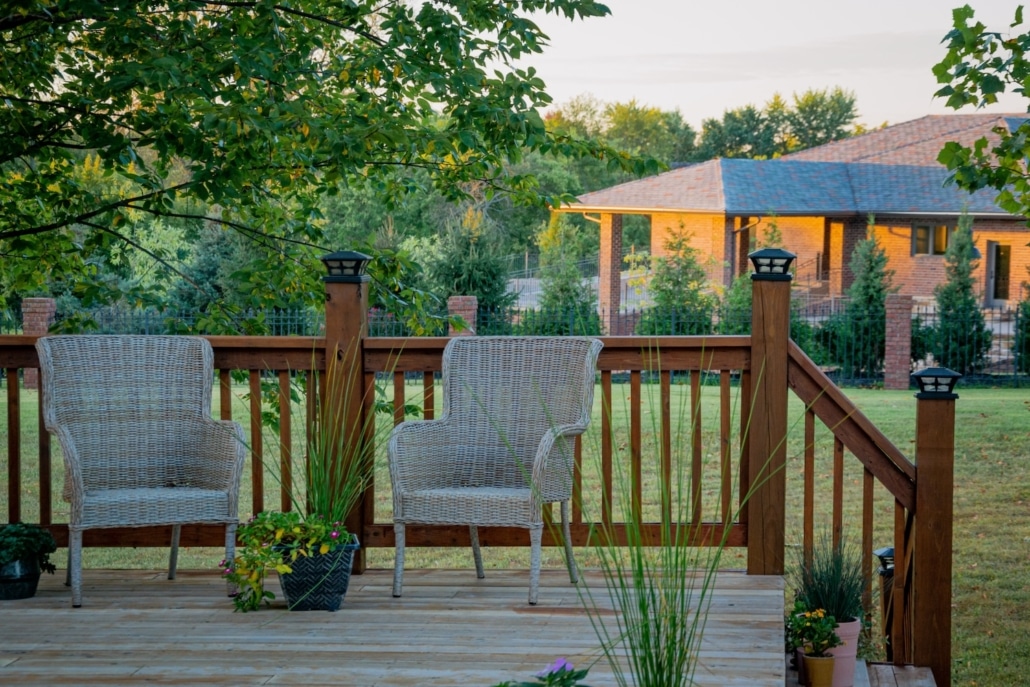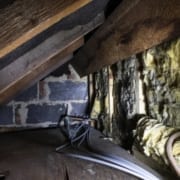What if I Don’t Want to Attach My Deck to the House?
A deck creates a perfect space to relax and entertain, but not every homeowner wants to attach one to their house. Whether it’s to avoid modifying the home’s structure, prevent moisture issues, or simply have more flexibility in design, a freestanding deck can be a great alternative.
Before moving forward with construction, it’s important to know how a detached deck differs from an attached one and what factors ensure long-term stability. This guide covers the pros and cons, common concerns, building code requirements in and around Jacksonville, plus key maintenance tips.
Can You Build a Deck Without Attaching It to the House?
Yes, a deck can be built without needing to attach it to the house, if you don’t want to—but it requires careful planning to ensure stability and safety.
Freestanding decks stand independently, supported entirely by posts and footings rather than being anchored to the home’s structure. Homeowners often choose a detached deck for a few reasons:
- Avoiding potential damage to siding, foundation, or waterproofing systems
- Greater flexibility in design and placement, especially for yards with uneven terrain
- Local building restrictions that may limit modifications to the home
- No need to cut into exterior walls or install ledger boards
While this type of deck provides flexibility, it also requires extra structural components to ensure long-term durability.
That being said, it’s important to weigh the benefits and potential drawbacks against your goals and needs. If you’re wondering whether a freestanding deck is the right choice for your home, here’s what you need to know.
Detached Deck Pros
- No changes to the house: A detached deck doesn’t require cutting into siding, drilling into brick, or reinforcing the home’s foundation. This makes it a good option for homes with stucco, masonry, or older construction.
- Less risk of water damage: Since the deck isn’t attached, there’s no direct connection trapping moisture against the house. This helps prevent issues like wood rot, mold, and foundation damage.
- More placement options: A freestanding deck can go anywhere in the yard, making it a great solution for uneven terrain, poolside seating, or homes with limited space near the house.
- Can be easier to get approved: Some homes aren’t designed to support an attached deck without major structural changes. In those cases, a detached deck may be a simpler option that avoids extra permits or reinforcement.
The Cons
- Needs more support: Without the house for stability, a freestanding deck relies entirely on its footings. This means more posts, deeper footings, and additional bracing, which can increase costs.
- Can shift over time: In areas with soft or sandy soil—common in Jacksonville—decks may settle or shift. Strong footings and proper drainage help prevent this, but extra reinforcement may be needed.
- Still requires permits: Even though it’s not attached, a detached deck must meet local building codes for safety. Height, weight capacity, and railing requirements all still apply.
- HOA rules may apply: Some homeowner associations limit detached structures. It’s always best to check community guidelines before building.
FAQ: Building a Safe and Durable Deck
Do all decks need footings?
What materials work best?
Can the deck be built directly on the ground?
What helps prevent shifting or sinking?
Are decks allowed in HOA communities?

Permits and Buildings in the Jacksonville Area
Even though a freestanding deck isn’t attached to the house, most still require a permit. Jacksonville and nearby areas have building codes in place to ensure decks are safe and meet structural standards.
Homeowners should keep in mind:
- Permit requirements depend on deck height, size, and location. Decks above a certain square footage or height may need approval before construction.
- Footing depth regulations ensure stability in sandy or shifting soil, common in Florida. Some areas may require deeper footings or reinforced piers.
- Railings and safety features are required for decks above a certain height to prevent falls and meet local safety codes.
- Property setback rules determine how far a deck must be from property lines, fences, or easements.
Other Recommended Maintenance
- Inspect the deck for signs of shifting, sinking, or uneven settling
- Keep drainage areas clear to prevent water from pooling under the deck
- Check for loose boards, fasteners, and railings to avoid safety hazards
- Clean and seal wood decks to prevent moisture damage and rot
- Ensure footings remain stable and show no signs of deterioration
When to Call a Professional
- They need help navigating local building codes and permits
- The deck is showing signs of shifting, sinking, or structural wear
- Footings seem unstable, especially in soft or sandy soil
- There are drainage concerns that could affect the deck’s longevity
- They’re buying or selling a home with an existing deck and want an expert evaluation
Conclusion
Don’t want to attach the deck to your house? A freestanding deck can be a great option for anyone looking for flexibility and fewer structural modifications to their home.
While it offers advantages like lower moisture risk and more placement options, it also requires careful planning to stay stable and meet building codes. For homeowners in or around Jacksonville who want to build a deck or get trained eyes on their home, Inside & Out Property Inspectors have the expertise you need.














